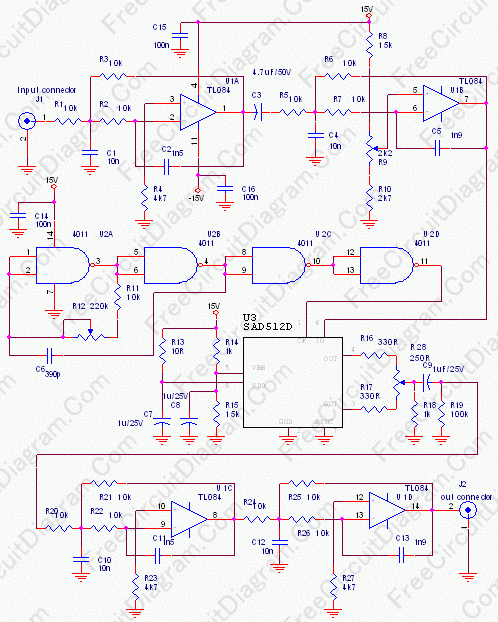Analog Audio Delay Line: Expand Your Virtual 3D Sound Space

It is fun to make a variable space in your small room, but it’s hard to make the actuator to move your wall or room partition. Using analog audio line delay, you can adjust your room virtually. Just turn a knob in your audio set and you can adjust your room size. The circuit described here will make your dream come true, giving a feel that your speaker is located 15 meters behind you, even though your room is actually 3 meters wide. Here is the circuit’s schematic diagram.
The core of this circuit is SAD512D integrated circuit, an analog audio delay. The chip uses 512 capacitors memory to hold 512 sampled analog signal. The delay can be adjusted from about 5,1 ms to 51 ms by R12 pot. Feed the input of this analog delay circuit with a mixed right and left audio signals from your stereo system. The output of this circuit then fed to a small power amplifier and place the output speaker behind you. Now you can perceive like your speaker is 15 m away behind (with maximum delay setting). If you build two unit the cascading the circuit will result in 30 meter expansion of your virtual room.
The circuit consist three main block. The first block (U1A, U1B) is a fourth order low pass filter (-24dB roll-off per octave) with 2.5kHz cut off frequency. The second block is the adjustable analog delay integrated circuit (IC SAD512D). The delay is controlled by the oscillator around U2 which is adjustable from 5KHz to 50Khz. The last block is similar to the first block, a low-pass filter with 2.5KHz cut off frequency.
A variable resistor R9 is provided to adjust the input offset, avoiding signal clipping and maximizing the audio range. For easy adjustment, feed the input with high level audio signal until the output is distorted, then adjust R9 until the distortion is minimum, or if an oscilloscope is available, adjust the R9 until the clipping is equal for both positive and negative cycle. Finally, adjust R28 to give minimum sampling clock noise.
Here is the parts list for the circuit:
[TABLE=2]